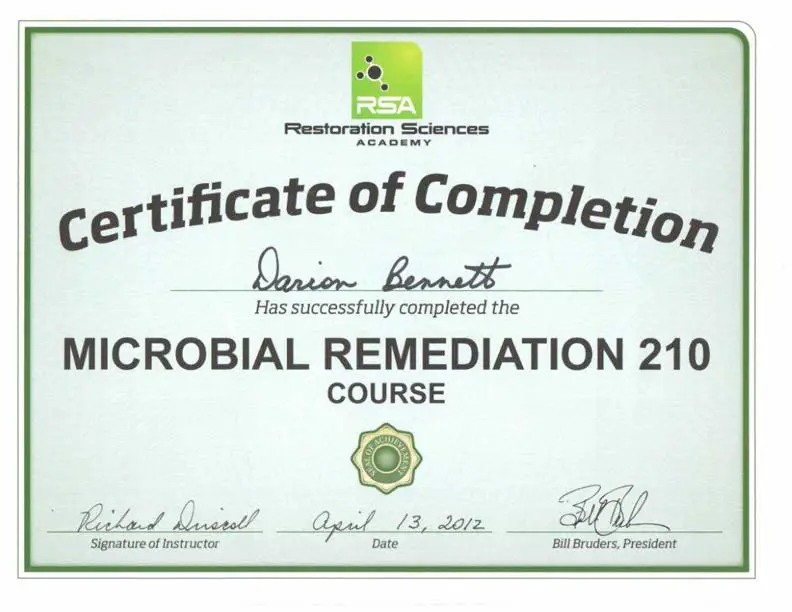Mold Remediation Certification is a specialized certification required for those who perform mold remediation, also known as mold removal or abatement, in certain states. The purpose of requiring certification is to ensure that people performing these services are qualified and operating according to local laws. Mold remediation involves identifying and removing harmful molds from indoor environments, and it can be dangerous if done incorrectly.

Louisiana, Texas, and New York are the only states requiring certified mold remediation professionals. To obtain this certification, individuals must meet specific criteria established by eastate’se’s licensing board. Requirements vary but may include passing an exam on applicable standards and regulations, obtaining liability insurance, completing a practical field training program, and providing evidence of work experience. Proof of financial responsibility may also be required for some certifications.
Once certified, professional remediators have access to specific resources such as approved products and services, technical support from industry experts, potential job opportunities within their state or region, and additional training opportunities that can help them gain further expertise. The certification also serves as a way for the public to identify a qualified individual when shopping for professional services related to mold removal or prevention.
The dangers of mold infestations are well documented and range from allergic reactions to serious respiratory issues such as asthma attacks or other lung complications. Certified remediators typically use methods such as air sampling tests and infrared imaging technology to detect hidden sources of mold before beginning work on affected areas to assess the level of infestation. They then use proper containment procedures during the process before using biocides and HEPA vacuums to vacuum up the remaining particles after the completion of the treatment and cleaning processes.
Several houses and commercial buildings in California are vulnerable to mold growth. Exposure to mold spores is known to cause severe health problems, so authorities appoint inspectors to conduct regular checks in mold-prone areas.
How to Become a Certified Mold Inspector in California?
You do not need special certification to acquire certification as a mold remediation inspector in California.
Please see the proof from the California Department of Public Health:
There is no legal requirement in California for training, licensing, or certification of mold assessors to identify a mold or dampness problem or of mold remediators to fix a mold or dampness problem. Some other states, such as Louisiana, Texas, and New York, do require mold assessors or remediators be licensed in the state, but there are no federal licensing regulations.
Anyway, the excellent Mold inspection textbook can be downloaded here .
.
One hour mold inspection training you can see in the video below:
Later on, you may pursue additional courses or training in the relevant field.
If you need to get certification as a mold remediation inspector in Louisiana, Texas, and New York, you must pass the exam. To qualify for the Louisiana, Texas, and New York license, you must complete a state-approved mold remediation training course and pass the Mold Remediation Contractor Exam.
For example, in New York, you can read more on the public website: https://dol.ny.gov/mold-program.
To become a certified mold assessor or remediation contractor in New York, you must pass the appropriate certification exam administered by the New York State Department of Labor.
For mold assessment, you must take the Mold Assessor Exam, which tests your knowledge of mold assessment, inspection, and remediation. The exam has 100 multiple-choice questions; you must score at least 70% to pass.
For mold remediation, you must take the Mold Remediation Contractor Exam, which covers mold remediation techniques, safety protocols, and applicable laws and regulations. The exam consists of 50 multiple-choice questions; you must score at least 70% to pass.
Conclusion
Mold remediation can be expensive due to the potentially high cost of materials needed and the labor involved in treating larger areas where there may be multiple levels of contamination present; however, it’s essential not only for health reasons but also because it preserves property value by preventing more costly damage down the line due to neglecting necessary treatments early on in an infestation cycle.
Investing in certified professionals makes sure this kind of work is done correctly so that future problems can be avoided—a cost-effective measure for most property owners over time, given the long-term nature of these issues versus short-term solutions or band-aid fixes from uncertified personnel who are often unable to address deeper root causes or consequences associated with neglecting them altogether which could result in hefty repair bills down the line when things get out a hand even further than initially assumed at project onset.





